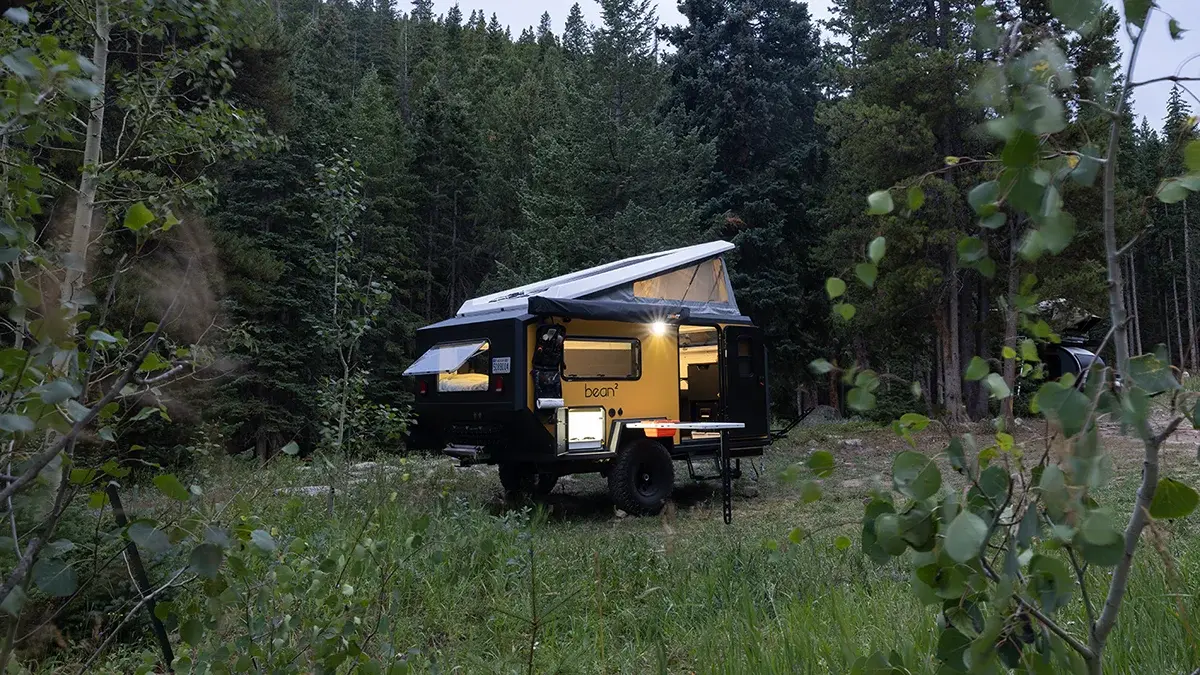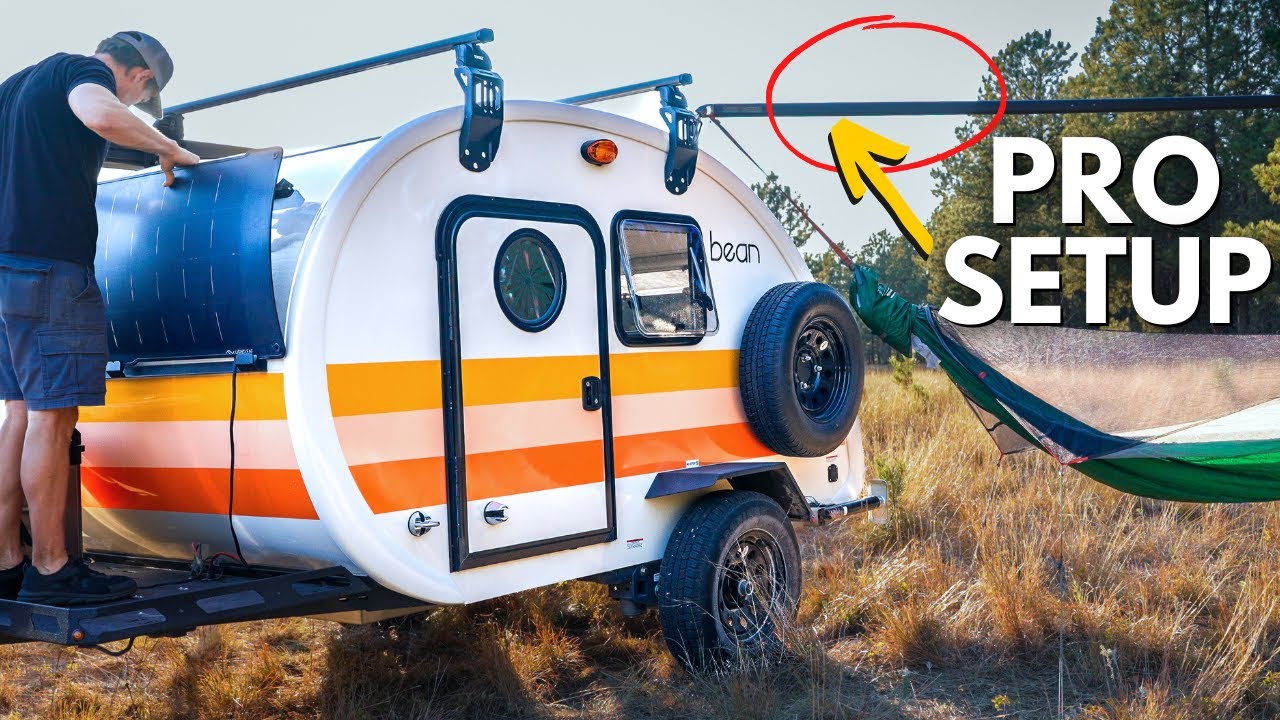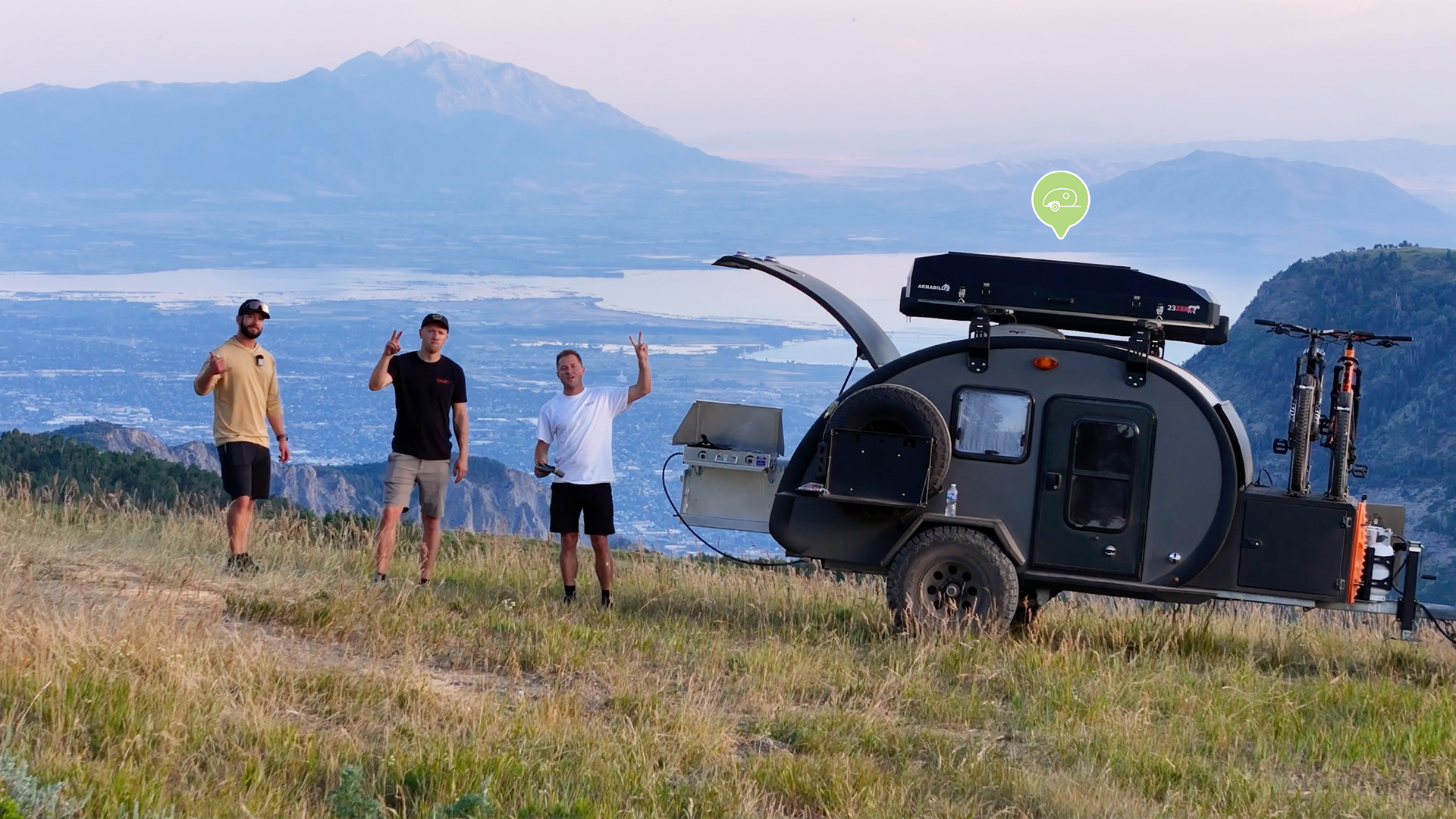
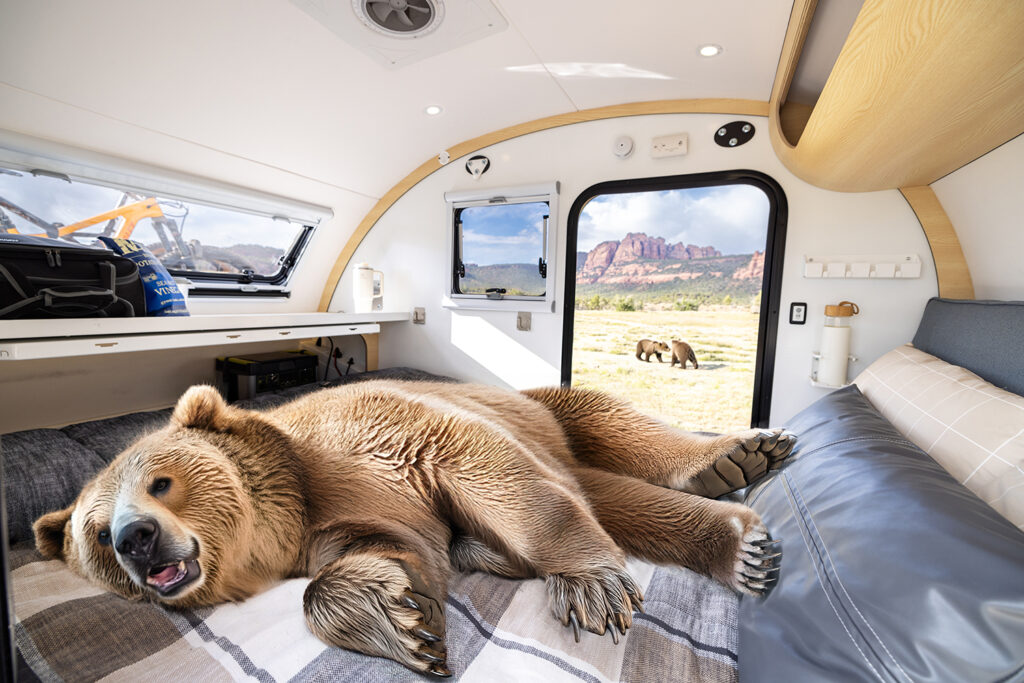
Is a Bean Trailer bear-proof? This is a question we receive sometimes from new trailer owners preparing for adventures in bear country. It’s a critical concern, especially for those planning to camp in dense wilderness areas. The short answer is no, but Bean is one of the most durable and tough teardrop trailers in the country so this should increase your peace of mind, especially in comparison to a tent. Millions of RV owners travel the country each year with rare interactions so we don’t think this should deter you from enjoying your trailer to the fullest. When it comes to black bears, several precautions can be taken with your trailer.
Bears, particularly when hungry, will actively search for alternative food sources. Unfortunately, sometimes that food source can be found near your vehicle or rig. There are some clear dos and don’ts, mixed with situational judgment. If you have a zero tolerance for bears, the worst areas to camp are where they have been trained to seek out people food. Locations like Yellowstone have bears that know exactly what’s in coolers and even sealed cans. Bears learn how to open common latches and are powerful enough to rip through walls. If bears are a significant concern for you, it’s advisable to avoid overnight camping in popular national parks or any developed campground with known bear problems.
On the bright side, popular areas with bear interaction problems are generally well equipped with bear-proof lockers, signs, information, and patrols. A good strategy is to talk to a ranger or campground host to get up-to-date advice for the particular area and circumstances. Always use bear lockers when provided in campgrounds; in many places, it’s required by law.
Another major factor in bear prowling is desperation due to a lack of wild foods. For example, in areas where American black bears are common, a poor season for berries can lead to starving bears walking through neighborhoods in broad daylight, looking for anything to eat. Bears have been known to break into porches to get into pet food and even rip doors off hinges for non-food items like fertilizer.
According to the National Park Service (NPS), bears have the keenest sense of smell of any animal—seven times better than a bloodhound or 2,100 times better than a human’s. Even an average person will notice an entire campground reeks of food, so it should be no surprise if a bear wanders through one looking for an easy target.
Here are some best practices to follow, especially in areas where bears, raccoons, or other animals may be a problem:
- Use Bear Deterrents: Carry bear spray and know how to use it. Keep it readily accessible, especially at night. Additionally, consider using noise deterrents like air horns if a bear approaches your campsite.
- Keep a Clean Camp: Don’t throw food or food wrappers in a campfire, and don’t dispose of any type of wash water near camp, as bears are attracted to soaps, lotions, and toothpaste.
- Use Ammonia: Animals with a keen sense of smell do not like ammonia. It’s a good, pungent cleaner that doesn’t smell edible. Wipe down the galley surfaces with a solution of ammonia and water, including the cooler and bottom edge of the galley door (the bottom corners are designed to drain, not seal). When the animal risk is high, hang an ammonia-soaked rag on the galley latch.
- Store Food Properly: Do not store unsealed containers of food in the trailer. The refrigerator is generally considered a sealed container, but still, seal food like cheese and meats separately in ziplocks or use a compact seal-a-meal type system.
- Use a Tote System: Store sealed food in a single half-size Trofast container in the Bean galley cabinet. The rest of the food should be in a 12v cooler or totes, which allows easy transfer of food to your vehicle at night or when away from camp. This system also makes it easy to carry all leftover food into the house after each trip.
- Choose Campsites Wisely: Be selective when choosing a campsite, whether in a campground or not. Steer clear of spots with any type of trash, food scraps, or funky smells in or around the site. It can be tough because many fire pits are used as trash dumps, so carry a folding fireplace grill system for campfire cooking without the toxic residues.
- Educate Yourself: Before heading out, research the area you plan to visit. Understand the local bear population and any specific regulations or guidelines provided by park authorities.
Always remember, the best way to avoid bear problems is to ensure that your campsite is not an attractive target for these powerful and intelligent animals. Stay safe and happy camping!
One Bean owner recently asked a question about bears in our owner’s group: “With people cooking in their trailers it seems like a great opportunity for them. Have there been many incidents of trailers being destroyed?”
Let’s take a look at the answers from Bean Trailers owners:
“I had a black bear visit at 2 am while staying in the Manistee National Forest in Michigan. I had stored all the food in a Yeti 65 cooler in the back of my 4Runner. My mistake was eating trail mix while watching a movie earlier. The max fan had wafted the peanut smell into the woods. He had both paws on the wheel well of my Black Bean and his nose in my screen window. I quickly pushed the horn alarm on my 4Runner, and the noise sent him scurrying into the woods.” – Denny S.
“Camping is much less risky where bears have wild foods and haven’t been programmed to hunt for people food. Generally, bears prefer to avoid people and dogs but in problem areas, they become bold and look for easy targets. Never approach or get between bears, especially cubs. Bears can run about 30 miles an hour and can climb trees, even grizzlies. I once watched a black bear bolt 50 feet to a tree, then straight up about 20 feet, moving at least twice as fast as humanly possible. Luckily, our dog was chasing it.” – David C.
“Camped all over Colorado and California in black bear country and never had an issue. In my experience, black bears are a way bigger problem than grizzlies. They are pretty smart and can teach their babies what they’ve learned. But they have to learn it somehow to associate the trailers or cars with food. Even then, the ones who tend to learn that humans equal food tend to get shot and not pass on their knowledge. The exception would be national parks like Yosemite, where they tend to frown on people shooting garbage bears.” – Vudi A.
“I also live in rural Colorado. We haven’t had any problems regarding bears but keep a can of bear spray and an air horn within reach in our Bean just in case. I do cook in the galley and keep food stored in the Bean but always close it when we’re not nearby. I usually bring a cooler for extra dry goods to keep in the car to keep the odors down, rather than leaving them in bags.” – Rica P.
“The thing that sold us was that a video posted by a young man and his girlfriend who had taken a year off to travel around America in another brand of teardrop trailer (not nearly as well built as a Bean). They had “something” shake their teardrop in the middle of the night. The next morning, the industrial-sized dumpster was turned over, but their teardrop was just fine. They found out that a bear had gone through their area that night. He also had some discussion about the width of the wheelbase of the teardrop preventing tipping by being rocked. This was 3 plus years ago I saw that video, but it’s what convinced me to get the Bean!” – Kay D.
“We leave our food, cooler and grill in the galley. We put our garbage in the locked car at night or when gone from camp. I’m not sure if that’s the right thing to do, but it seems to negate the convenience of the galley if you have to move everything in and out each day. It’s a good idea to have bear spray handy and keep your car keys near you at night. You can set off the car alarm to try to scare a bear away.” – Stephanie H.
By following precautions and learning from other Bean owners’ experiences, you can significantly reduce the risk of bear encounters and enjoy a safer camping experience. Happy camping!
Don’t hesitate to reach out to our trailer experts if you have additional questions or would like a tour of our RV Dealership here in Salt Lake City, Utah. Give us a call at 844-770-7036 or email us at sales@beantrailer.com. We are happy to help!
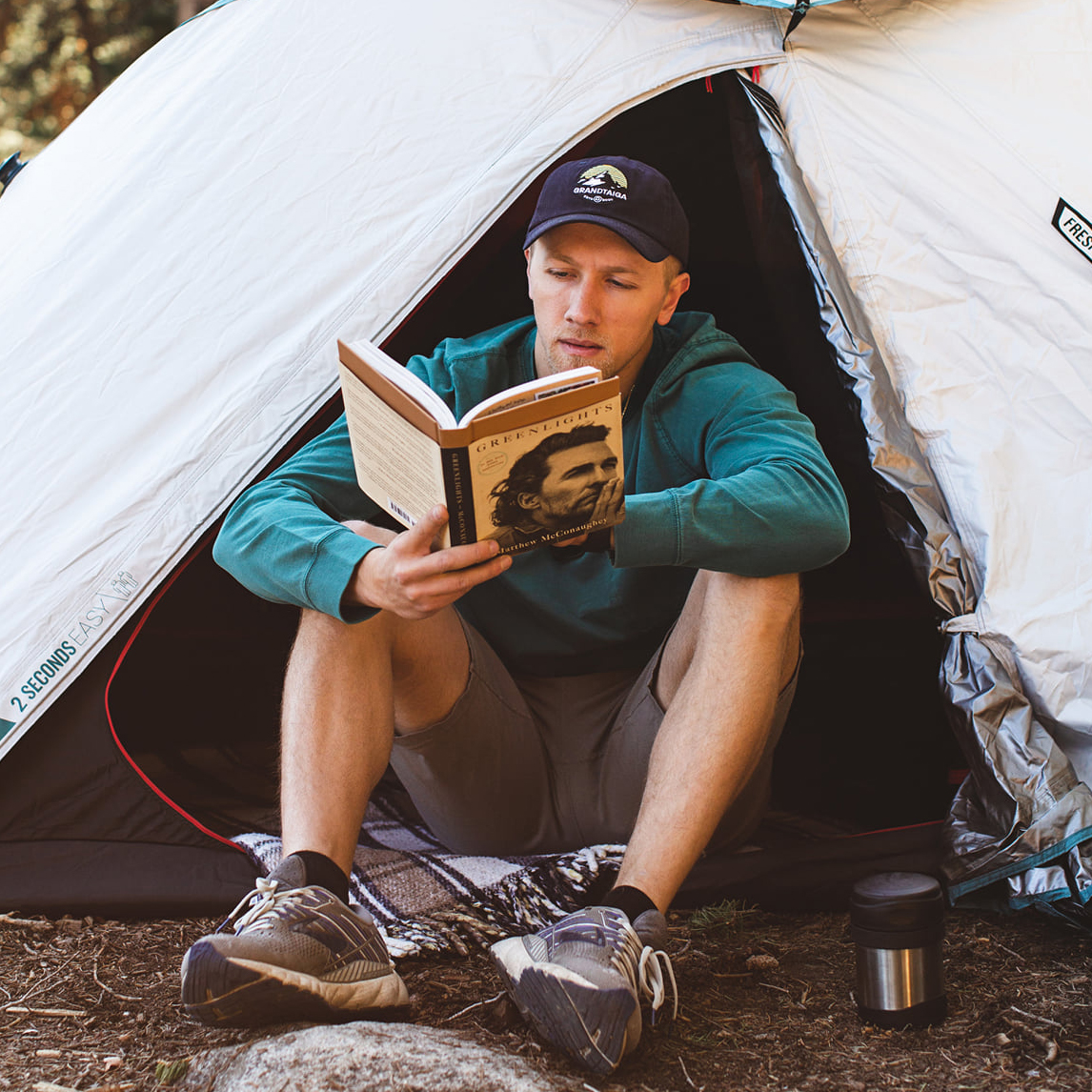
Nick lives a “can do” lifestyle, with a deep passion for exploration, and curious living. His goal has always been to encourage everyone to get outside, live healthier, and walk lighter on our feet.

